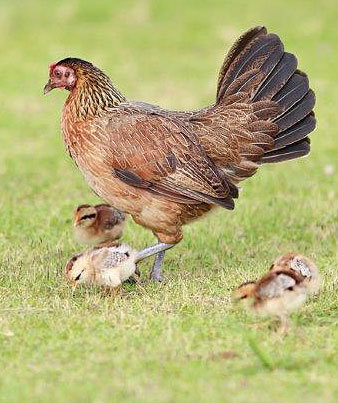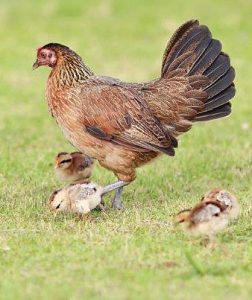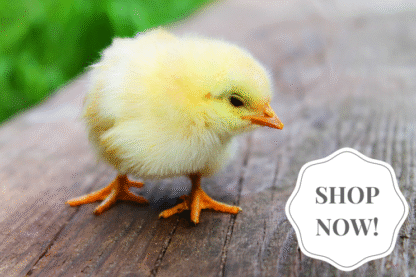
Some chicken breeds make great broody hens. Others are iffy. Still others are completely unreliable. And some never go broody at all.
What does broody mean and why does it matter? Broodiness, in a nutshell, is maternal instinct. After a hen has accumulated a nestful of eggs, maternal instinct tells her to keep the eggs warm and they will eventually hatch into chicks. In a word, she “goes broody.”
Because laying stops when broodiness starts, throughout the ages people who kept chickens primarily for eggs removed persistently broody hens from their breeder flocks. As a result, the chicken breeds best known for superior laying ability — especially those developed for commercial production — are less apt to brood than other breeds. If you want your hens to raise their own chicks, you need a chicken breed known to go broody.
Even among chicken breeds that make the best broody hens, you can’t tell for sure if a particular hen will be a good mother until she proves it. But you can get a pretty good idea based on the past records for the breed as a whole. Hens of some breeds are especially well known for readily going broody and having the tenacity to see it through to a successful completion.
Here are 8 chicken breeds that are most likely to go broody:
- Aseel — These hens are not especially good layers, but they have a strong maternal instinct and make terrific mothers.
- Cochin — When it comes to broodiness, Cochin hens are among the best of the best.
- Dorking — These hens are known for persistent broodiness and excellent mothering ability.
- Java — The critically endangered Java is a calm chicken breed with an excellent brooding instinct.
- Modern Game — Although these hens don’t lay well, they are strongly broody and make intensely protective mothers.
- Nankin bantam — One of the oldest chicken breeds, the diminutive Nankin bantam has extraordinary maternal instincts.
- Old English Game — These hens not only lay well, but make reliable broody hens and devoted mothers.
- Silkie bantam — Without doubt the most consistently dependable broody hens, Silkies will attempt to hatch anything that remotely resembles an egg.
Some chicken breeds rarely become broody within their first year but may brood successfully during subsequent laying cycles. This trait, called deferred broodiness, is notable among Chanteclers and Fayoumis. Individual hens of other breeds may defer broodiness, as may hens resulting from a cross between a hen from a chicken breed that typically broods and a rooster from a less maternal breed.
Even among breeds that do not typically brood, some strains have stronger brooding instincts than others, and among those with the least brooding instinct, the occasional hen becomes fiercely broody. Just as broodiness has been bred out of certain strains, the trait may be improved in your flock by keeping as your future breeders only chickens that were naturally hatched under a broody hen.
And that’s today’s news from the Cackle Coop.
Gail Damerow is the author of Hatching and Brooding Your Own Chicks



So of the listed breeds, which would be able to cover more of my duck eggs?? Or, what is the biggest hen here?
On size and able to cover as well as broodiness would be the Brahmas or standard Cochin.
Plymouth Barred Rock roosters are very nice
Serama mothers are the best setters and teach their chicks well.
Serama roosters are docile.
Any rooster breed can be aggressive, the word cocky comes from their behavior, based off territorial imperative. If you have a rooster that attacks you, get rid of it, he will likely throw more sons that have the tendency to become a “manfighter”. Never shoo a rooster away with your foot either, it could trigger a fighting response. A good rooster should just move out of your way as you walk. Hold the rooster often, literally pick him up and just walk around with him as he grows up, he shouldn’t fear you or think you’re a competitor. I raise American game and Asil, haven’t had an aggressive (toward humans) rooster in over 20 years. Asil make the best mothers I’ve ever seen, as in total free range, most number of surviving chicks.
What do they look like, the Asils
I don’t think I’ve seen one
I have 10 different breeds of hens.
The ONLY ones that Set are the Sebrites.
Polish, Brahma, Silkie, and Cochin are all friendly roosters
I have campine and wellspring mixed roosters and they don’t attack me Lisa Watkins. They actually run from me. But I had a jersey giant that used to attack my son but he was an amazing protector of the hens and sacrificed his life to save them. also I keep hearing Rhode Island reds aren’t good broody hens but mine and my brothers RIR hens have been amazing broody hens and I am witnessing beautiful babies hatching as I speak.
Wow! You didn’t mention buff orpingtons. I had read they were good broody hens. I had one raise a bunch of guineas last year.
P.s. can you blog about gentlest roosters, that won’t attack when you cross your yard? ?